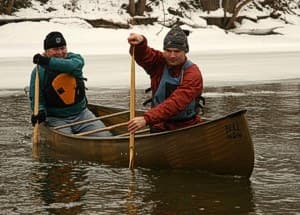Paddling Instruction v. Paddling Expedition
It's your first trip down a wild Canadian river. You expect big rapids, large lakes and long portages. You judge yourself capable in intermediate level (Class II-III) rapids. Beyond that, things get scary fast. How can you best improve your skills?
(A) Enroll in a whitewater canoe class.
You'll learn to run big drops and perform powerful peel-outs and eddy turns in dicey currents. If you can play in rough rapids in a sport canoe, you'll whiz through Class II in a tripping canoe.
(B) Take a shake-down trip with someone who has canoed up north. Select a route that has risky rapids and large lakes. Pack enough stuff for a week. And plan to stay that long.The answer is a resounding B!
Accomplished paddle skills are second to good judgment-knowing your limitations, and your boat's. Indeed, whitewater play procedures can even be a detriment, as this case illustrates:
The Cree River is located in the remote northwest corner of Saskatchewan. The current is very fast and technical Class II rapids go on for miles. Constricted channels and boulder gardens discourage eddy turns.
In 1984, I guided a canoe trip down the Cree for the Science Museum of Minnesota. All were intermediate level paddlers except for two Texas sport boaters who regularly canoed Class III.
A few hours into the trip, we came upon a fast, shallow rapid. Hip-high boulders confused the channel-there appeared to be no outlet. But wait! Just ahead, there was a clear but narrow slot near shore. Getting there meant you had to "backferry" right now! I yelled, "Backferry!" Then, I modeled the procedure and slipped cleanly through the slot. Three boats followed suit - no problems. Then came the Texans who tried to turn and ferry upstream, hopeful they could eddy out in time. Big mistake! Their canoe caught a rock and the rest is history. Later, when they had dried out they told me they didn't know how to backferry - their instructors told them it was a "knee-jerk reaction of last resort". "We were taught," said one, "That a forward ferry is always the way to go."
Wrong. Dead wrong!
This scenario has repeated itself so many times on my canoe trips that I feel the need to speak out. Whitewater schools provide sport canoes and kayaks that pivot on a penny-and they rightfully teach techniques that are appropriate for these boats. But a wilderness cruiser is a big bruiser, that when loaded, weighs three-tenths of a ton and may need 20 feet to turn!

See the problem?
Whitewater schools rightly emphasize aggressive bow upstream techniques; wilderness trippers rightly de-emphasize them. They (sport paddlers) ferry forward, we (wilderness trippers) go back. They play in rapids; we run or line the edges. When in doubt, we portage!
I plead for whitewater schools to re-think their instruction, at least for beginning level canoeists, or for those who will "paddle north". Not everyone who takes a whitewater class will don a dry suit and helmet and brave bad rapids. Indeed, it's probably fair to say that most students who choose to paddle a canoe don't own a hot sport boat and probably never will. What they really want to learn is how to better paddle their family canoe or wilderness tripping boat in rapids.
A sport canoe or kayak is like a hot Porsche; a wilderness tripping boat is like a lumbering 16-wheeler. With whom would you choose to drive a loaded semi down a winding mountain road-a LeMans race car pro or a long haul trucker?
Learn to drive a truck before you head up north!
Cliff Jacobson is a professional canoe guide and outfitter for the Science Museum of Minnesota, a wilderness canoeing consultant, and the author of more than a dozen top-selling books on camping and canoeing. www.cliffcanoe.com
Related Articles
Just as vehicles have roads and rules that dictate the way they travel over land, the flow of boat…
View all Paddling Locations in New York ► ► All of our New York paddling locations are from paddlers…
View all Canoeing & Kayaking Locations in Los Angeles ► ► All of our Los Angeles paddling…
One of the best things about kayaking is that it's a healthy and fun activity to share with your whole…



